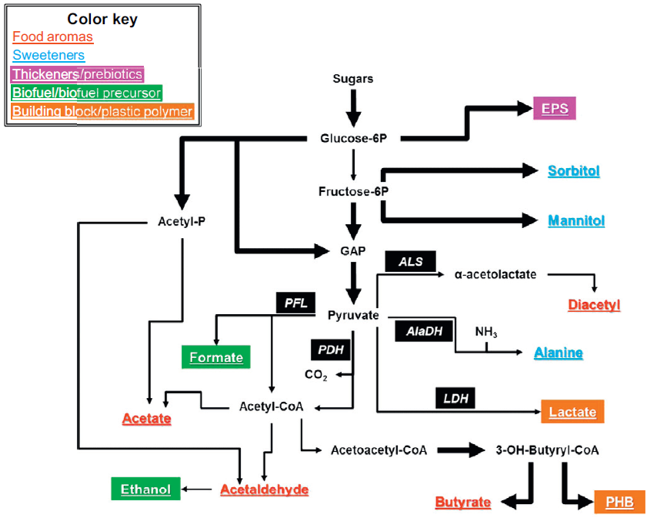Lactic Acid Bacteria Fermentation
Lactic acid bacteria (LAB) or Lactobacillales are industrially important microbes used in a large variety of industrial processes such as food fermentation. Not only do LAB have great potentials for in situ production of fermented foods, but they also seem promising in metabolic engineering. Their contribution in fermentation processes primarily roots from the formation of lactic acid. Besides, LAB enhance other product characteristics such as flavor, texture and nutrition.

Figure 1. Metabolic pathway overview to produce some of the most industrial desired molecules
(Biotechnology Advances, 2014)
The main application of LAB in industrial processes is to serve as food starters (e.g., for dairy product, pickles, meat and wine). In addition, they are able to metabolize numerous mono- and di-saccharides. Furthermore, natural or metabolically engineered LAB produce many metabolites with confirmed applications:
- antimicrobial molecules (e.g., bacteriocins);
- food aromas and flavors (e.g., diacetyl and acetaldehyde);
- food complements (e.g., vitamins);
- food texturing agents (e.g., exopolysaccharides);
- sweeteners (e.g., mannitol);
- nutraceutical molecules;
- bulk chemicals (e.g., lactic acid and ethanol);
- biodegradable plastics (i.e., polyhydroxyalkanoates, PHA).
Metabolic engineering is usually applied to broaden the range of carbon sources or improve its product yield and productivity, largely for food grade applications. L. lactis is the most extensively studied species among LAB, along with other species include L. plantarum, L. brevis, L. panis, and others.
Profacgen provides industry-scale lactic acid bacteria fermentation with the most advanced technologies and facilities. Our service is highly customizable from optimization of expression and growth condition to large-scale production, purification and characterization. We have the fermentation capacity of up to 10 metric tons, as well as professional one-stop technical support including:
- Strain selection.
- Genetic modification.
- Growth condition optimization.
- Large-scale fermentation.
References:
1. Mazzoli, R., Bosco, F., Mizrahi, I., Bayer, E.A., Pessione, E. (2014) Towards lactic acid bacteria-based biorefineries. Biotechnology Advances. 32: 1216-1236.
2. Hugenholtz, J., Smid, E.J. (2002) Nutraceutical production with food-grade microorganisms. Current Opinion in Biotechnology. 13: 497-507.